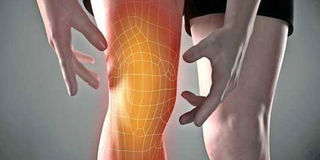Help for arthritis, cysts and period pain

Inflamed knee.
Dr Flo, I have been having joint pain mostly in my elbows and knees for quite some time. After taking painkillers it ceases, but if I do manual work the pain is too much. Please help me. John
Dear John,
The recurrent pain in several joints suggests that you may have arthritis, which means there is inflammation at a joint. It can affect one or more joints in the body, including the upper or lower limbs and even the bones of the spine. Arthritis can result in pain, swelling, stiffness and/or warmth at the joint. It may be caused by wear and tear of a joint; overuse; infection; injury; gout or an auto-immune illness (where the immune system attacks some parts of the body, in this case, the joint).
You are more likely to suffer from arthritis if a close family member also has arthritis, or if you are older in age, or if you have had injury to that joint before, or if you are overweight.
Arthritis symptoms are recurrent and never fully go away. Treatment aims at reducing the symptoms and reducing further damage to the joint. There is medication to relieve pain and inflammation. Physiotherapy also helps with the symptoms. Treatment also depends on the cause of the arthritis e.g. if there is gout, then medicine to reduce uric acid levels is also prescribed.
Other measures that can help include maintaining a healthy weight, proper diet, reducing alcohol consumption (especially beer), reducing consumption of meat and seafood, taking a lot of water, exercise, and use of hot or cold packs.
Dr Flo, I was diagnosed with a cyst on my left testicle last October, and though I was referred to a surgeon, his advice was that the cyst was not a serious matter. I have tried several drugs, but it is still there, though it has reduced in size. It is not painful unless it is pressed between my fingers. Could you please tell me how to deal with it? AW
Dear AW,
The cyst in your testicle is most likely a spermatic/epididymal cyst, otherwise known as a spermatocele. This is a fluid-filled sac in the epididymis, which contains a pool of dead sperm. The epididymis is a long coiled tube where sperms mature as they pass through. The spermatocele is usually not painful, though sometimes it may be. It may cause enlargement and heaviness of the affected side if it is large. It occurs in about 30 per cent of men, usually between ages 20 and 60.
To make a diagnosis, the doctor will do a physical examination, then shine a light on the affected side to see if light will pass through. This is called trans-illumination, and light will pass through the fluid, but it wouldn’t pass through a solid mass. An ultrasound scan confirms the diagnosis.
It is not cancerous and it does not affect fertility. Because of this, it is advisable to leave it alone. Some fluid may be drained from it with a needle, though it will usually re-accumulate. If you do not want any more children, the fluid can be drained and then sclerotherapy done, to form scar tissue. Surgery can also be done to remove the sac or to remove the testicle if the cyst is very large. Please visit an urologist for further review.
Dr Flo, what causes severe period pain? Pauline
Dear Pauline,
Painful periods are referred to as dysmenorrhoea. There are two types – primary and secondary. Primary dysmenorrhoea occurs due to spasms or contraction of the uterine wall during menstruation and also due to release of some chemicals called prostaglandins and leukotrienes. It starts within the first few years after the beginning of periods, and it affects almost half of all women. Secondary dysmenorrhoea occurs due to an underlying problem e.g. fibroids, endometriosis or pelvic disease. It starts later in a woman’s life and treatment of the underlying problem will usually get rid of the pain.
Severe dysmenorrhoea may be associated with longer, heavier periods, early age of onset of periods, family history of severe pain during periods, smoking, and obesity.
Treatment involves medicines to manage the pain and reduce the uterine contractions. Other measures that may help include physical activity, warm compresses and getting enough sleep. If the discomfort is severe, oral contraceptives may be used. Pregnancy and giving birth may affect the severity of the discomfort in later cycles.
Send your medical questions to [email protected] for free expert advice


